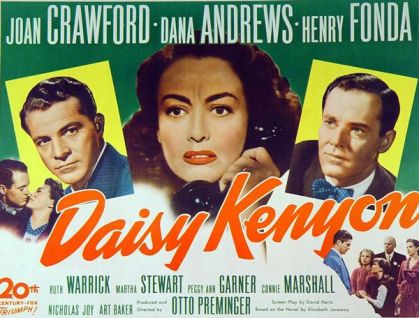Daisy Kenyon (1947): 5/5! – Contains mild spoilers
Daisy Kenyon opens with an awesome, fun-fact-spewing cabbie (who is never seen again, but is a great way to start the film) and a romantic, airy song.
This opening may set a viewer who has never seen or read about the film before to think that it’s going to be a comedy, but don’t be fooled! This film is a textbook melodrama.
Joan Crawford is Daisy Kenyon, a woman stuck in a love triangle. The apples of her eye are Dan (Dana Andrews), who happens to be married, and Peter (Henry Fonda), who feels more strongly for Daisy than she does for him.
Daisy Kenyon takes the viewer on an emotional roller-coaster of a journey, similar to that which Daisy herself experiences.
The viewer roots for Daisy and Dan in the beginning of the film, because it’s easy to see that she loves him more than Peter. It’s also apparent that Dan is unhappy in his marriage. His wife is harsh, and they don’t always agree on how to deal with the children. So despite the fact that he’s married and has a family, the viewer wants to see it work out for them somehow.
This changes as the film progresses, and the viewer gets to know Peter more. His love for Daisy is nearly tangible, and he wants nothing more than to build a life with her. Fonda succeeds in drumming up a whole lot of sympathy for his character, leaving the viewer on his side for a while.
But by the end, the question of who the viewer should be rooting for isn’t quite so clear cut. Without giving away too much, Daisy has grown and her feelings have shifted, though not necessarily in the direction that the viewer expects.

Though the film’s simple love triangle plot is quite common and it does follow the conventions of the melodrama genre, it also sets itself apart.
The unbeatable cast is one way in which Daisy Kenyon is distinguishable from others of its kind. Joan Crawford appears in a softer role here than I’m used to seeing her in: a love-lorn woman who is torn between her heart and her obligations.
It doesn’t hurt, either, that her two handsome leading men are so effective and captivating on screen. It’s easy to see why she would fall for them, and why she would fall hardest for Andrews, who seems irresistible despite his flaws and his existing family.
The film is also set apart in the fact that it’s probably the least soapy melodrama I’ve seen. It seems very real and is full of tension rather than cheese.